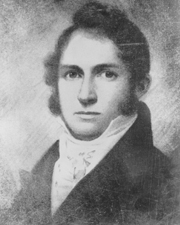John McLean (Illinois politician)
| John McLean | |
|---|---|
 |
|
|
United States Senator from Illinois |
|
|
In office November 23, 1824 – March 3, 1825 |
|
| Preceded by | Ninian Edwards |
| Succeeded by | Elias Kane |
|
In office March 4, 1829 – October 14, 1830 |
|
| Preceded by | Jesse B. Thomas |
| Succeeded by | David J. Baker |
| Member of the U.S. House of Representatives from Illinois's at-large congressional district | |
|
In office December 3, 1818 – March 3, 1819 |
|
| Preceded by | Inaugural Holder |
| Succeeded by | Daniel P. Cook |
| 2nd and 6th Speaker of the Illinois House of Representatives | |
|
In office December 4, 1820 – December 2, 1822 |
|
| Preceded by | John Messenger |
| Succeeded by | William M. Alexander |
|
In office December 4, 1826 – March 4, 1829 |
|
| Preceded by | David Blackwell |
| Succeeded by | William Lee D. Ewing |
| Personal details | |
| Born |
February 4, 1791 Greensboro, North Carolina |
| Died | October 14, 1830 (aged 39) Shawneetown, Illinois |
| Political party |
Democratic-Republican Democratic |
| Profession | lawyer |
| Religion | Christian |
John McLean (February 4, 1791 – October 14, 1830) was a United States Representative and a Senator from Illinois. He was the brother of Finis McLean and uncle of James David Walker.
Born near Guilford Court House (now Greensboro), Guilford County, North Carolina, February 4, 1791, McLean moved with his parents to Logan County, Kentucky in 1795. He moved to Illinois Territory in 1815. After studying law, he was admitted to the bar and commenced practice in Shawneetown, Gallatin County, Illinois. When Illinois was admitted as a State into the Union, McLean was elected to the Fifteenth Congress and served from December 3, 1818, to March 3, 1819. He failed to be re-elected in 1818 to the Sixteenth Congress. He was also an unsuccessful candidate for congress in the 1820 and 1822 elections. He was elected to the Illinois State House of Representatives in 1820, 1826, and 1828, and served as speaker.
In 1824, McLean was elected to the United States Senate to fill the vacancy created by the resignation of Ninian Edwards and served from November 23, 1824 to March 3, 1825. He was unsuccessful in a bid for re-election, not managing to get more than 12 votes of the 27 needed in the legislature through 10 ballots, but resumed the practice of law.
...
Wikipedia
